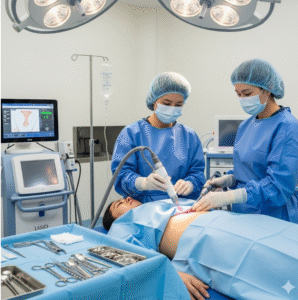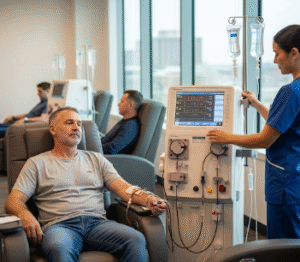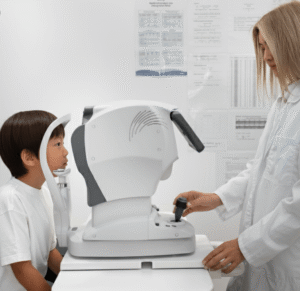Overview
Amniocentesis is a medical diagnostic procedure performed during pregnancy to obtain a small sample of the amniotic fluid surrounding the fetus. This fluid contains fetal cells and various chemicals that can provide valuable information about the baby’s health, development, and genetic condition.
Typically conducted between the 15th and 20th week of pregnancy, amniocentesis is most often recommended when there is an increased risk of genetic disorders, chromosomal abnormalities (such as Down syndrome), neural tube defects (like spina bifida), or certain inherited conditions.
Unlike routine ultrasounds or blood tests, amniocentesis provides a definitive diagnostic result for many genetic conditions, making it one of the most reliable prenatal tests available. However, because it is an invasive procedure, it carries small but real risks, including miscarriage.
In South Korea, amniocentesis is widely available in advanced obstetric hospitals and maternal-fetal medicine centers, where cutting-edge imaging technology and highly trained specialists ensure safe and precise results. Korean healthcare combines affordability, accuracy, and international standards, making it an attractive option for both domestic patients and international medical travelers.
Why It’s Done
Amniocentesis is not performed routinely for every pregnancy. It is generally offered under specific circumstances, especially when there are concerns about the baby’s health or genetic conditions.
Main reasons for performing amniocentesis include:
- Genetic testing:
- Detecting chromosomal abnormalities like Down syndrome (trisomy 21), Edwards syndrome (trisomy 18), or Patau syndrome (trisomy 13).
- Identifying single-gene disorders, such as cystic fibrosis, sickle cell anemia, or muscular dystrophy.
- Neural tube defect testing:
- Checking for conditions such as spina bifida or anencephaly by measuring alpha-fetoprotein (AFP) levels in the fluid.
- Fetal lung maturity:
- In later pregnancy (after 32 weeks), amniocentesis may assess whether the baby’s lungs are mature enough for early delivery.
- Infection testing:
- Detecting uterine or fetal infections that could complicate pregnancy.
- Paternity testing (rare cases):
- DNA in amniotic fluid can be analyzed for paternity verification.
- Maternal factors leading to recommendation:
- Maternal age (35+ years).
- Abnormal results from prenatal screening (ultrasound, blood test, or NIPT).
- Family history of genetic disorders.
- Previous child with congenital abnormalities.
Alternatives
While amniocentesis is highly accurate, other prenatal tests may be considered either before or instead of the procedure:
- Non-invasive prenatal testing (NIPT): A blood test analyzing cell-free fetal DNA, with high accuracy for common chromosomal conditions but not definitive.
- Chorionic villus sampling (CVS): Conducted earlier in pregnancy (10–13 weeks), testing placental tissue instead of amniotic fluid.
- Ultrasound: Can identify certain physical abnormalities, but not all genetic conditions.
- Maternal serum screening (quad screen, triple screen): Blood tests that estimate risk but do not provide definitive answers.
Key difference: Amniocentesis provides a definitive diagnosis, whereas other tests are primarily screening tools.
Preparation
Preparation for amniocentesis is straightforward but may vary depending on gestational age and medical condition.
- ✅ Ultrasound evaluation – an ultrasound is performed beforehand to determine fetal position, placental location, and fluid pockets.
- ✅ Medical history review – the doctor will ask about family history, prior pregnancies, and genetic risks.
- ✅ Discuss risks and benefits – informed consent is required before proceeding.
- ✅ Hydration and bladder status – in early pregnancy, a full bladder may be required; later, an empty bladder is preferred.
- ✅ Blood tests – sometimes ordered to check maternal Rh factor; if mother is Rh-negative, Rh immunoglobulin may be given after the procedure to prevent complications.
How It’s Done
Amniocentesis is performed as an outpatient procedure in a hospital or specialized clinic. The entire process usually takes about 30–45 minutes, though the actual fluid collection lasts only a few minutes.
Step-by-step process:
- Ultrasound guidance:
- An ultrasound probe is placed on the mother’s abdomen to locate the fetus, placenta, and safe area for needle insertion.
- Skin sterilization:
- The abdominal skin is cleaned with antiseptic solution to reduce infection risk.
- Needle insertion:
- A thin, hollow needle is carefully inserted through the abdominal wall and uterus into the amniotic sac.
- Fluid withdrawal:
- About 20 milliliters (around 4 teaspoons) of amniotic fluid is withdrawn. The body replenishes this fluid naturally within a few hours.
- Post-procedure monitoring:
- The fetal heartbeat and mother’s condition are checked via ultrasound immediately after the procedure.
- Laboratory testing:
- The sample is analyzed for chromosomal abnormalities, genetic mutations, AFP levels, or lung maturity, depending on the indication.
Pain level:
- Most women report mild discomfort or cramping, similar to a blood draw but deeper.
- Local anesthesia may be used in some cases, though often unnecessary.
Recovery
Most women can return home shortly after the procedure, but certain precautions are recommended:
- 🛑 Avoid strenuous activities, heavy lifting, or exercise for 24–48 hours.
- 🛑 Rest and hydrate well.
- 🛑 Mild cramping, spotting, or fluid leakage may occur, but usually resolves quickly.
When to call a doctor:
- Persistent abdominal pain or cramping.
- Heavy vaginal bleeding or fluid leakage.
- Fever or chills (signs of infection).
- Decreased fetal movement.
Results timeline:
- Genetic testing results: 1–3 weeks (depending on lab analysis).
- AFP results: a few days.
- Fetal lung maturity: usually available within 24–48 hours.
Risks and Complications
While generally safe, amniocentesis is an invasive procedure and carries small risks:
- ⚠️ Miscarriage risk: About 0.1–0.3% (1 in 1,000 to 1 in 300 cases).
- ⚠️ Infection risk: Rare, but uterine infection may occur.
- ⚠️ Injury to fetus or placenta: Extremely rare with modern ultrasound guidance.
- ⚠️ Amniotic fluid leakage: Usually resolves on its own within a week.
- ⚠️ Rh sensitization: If the mother is Rh-negative and the baby is Rh-positive, blood mixing can cause immune reactions (prevented with Rh immunoglobulin).
Treatment Options in Korea
South Korea is highly advanced in prenatal diagnostics and offers world-class amniocentesis services.
Where available:
- 🏥 Major obstetric hospitals and women’s health centers (e.g., Seoul National University Hospital, Samsung Medical Center, Severance Hospital).
- 🏥 Fertility and high-risk pregnancy clinics specializing in genetic counseling and prenatal care.
- 🏥 Private maternity hospitals across Seoul, Busan, and Incheon.
Why Korea is an excellent choice for amniocentesis:
- 🔬 Use of cutting-edge ultrasound and imaging technology for accuracy.
- 👩⚕️ Highly experienced maternal-fetal specialists.
- 🌍 Availability of English-speaking doctors for international patients.
- 💲 More affordable pricing compared to the US, Europe, or Japan.
- 🧬 Access to advanced genetic testing panels through Korean research labs.
Highlights
- Amniocentesis is a prenatal diagnostic test that analyzes amniotic fluid for genetic, chromosomal, and developmental conditions.
- Typically performed between 15–20 weeks of pregnancy.
- Provides definitive results, unlike non-invasive screening tests.
- Used to detect Down syndrome, spina bifida, cystic fibrosis, and more.
- Risks include miscarriage (0.1–0.3%), infection, or fluid leakage.
- Widely available in South Korea at top-tier hospitals and clinics.
- Cost in Korea ranges $1,100–$2,000, depending on facility and testing type.
- Highly recommended for women with abnormal prenatal test results, advanced maternal age, or family history of genetic disorders.













